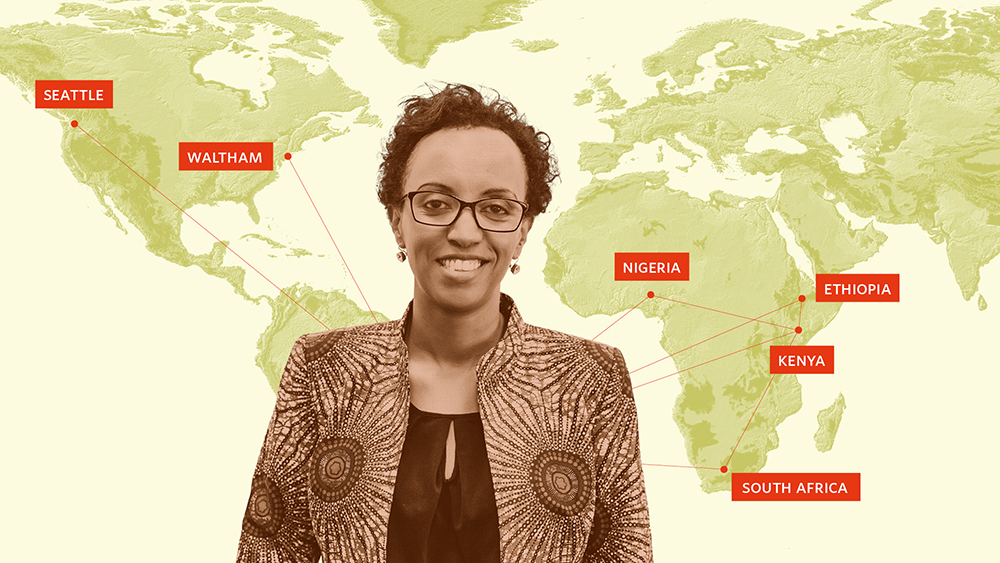
By Alix Hackett
When it comes to her career, Amrote Abdella, MA SID’07, has always considered Africa to be her North Star. Her passion for the continent has led her down a multitude of unfamiliar paths, driven by her desire to be a change-maker in the continent where she grew up.
“It’s landed me in spaces that I had absolutely zero knowledge about,” she says frankly, “but even if I didn't know anything at all, I knew that I knew Africa. That was really it.”
Today, Abdella is a leading voice for innovation and economic development in Africa, and an expert in how technology can be used to empower individuals and businesses in underserved communities. For the last eight years, she’s put these skills to use as director of venture capital and start-ups and now regional director for Microsoft’s 4Afrika Initiative, working on the ground in Kenya to set a technology revolution in motion.
“My overall responsibility is to make sure that my team and I deliver on business development opportunities across Africa,” she explains. “Where would it make sense for Microsoft to invest to be able to bring the mission of the company to life, but also make a difference in people’s lives?”
Connecting Africa
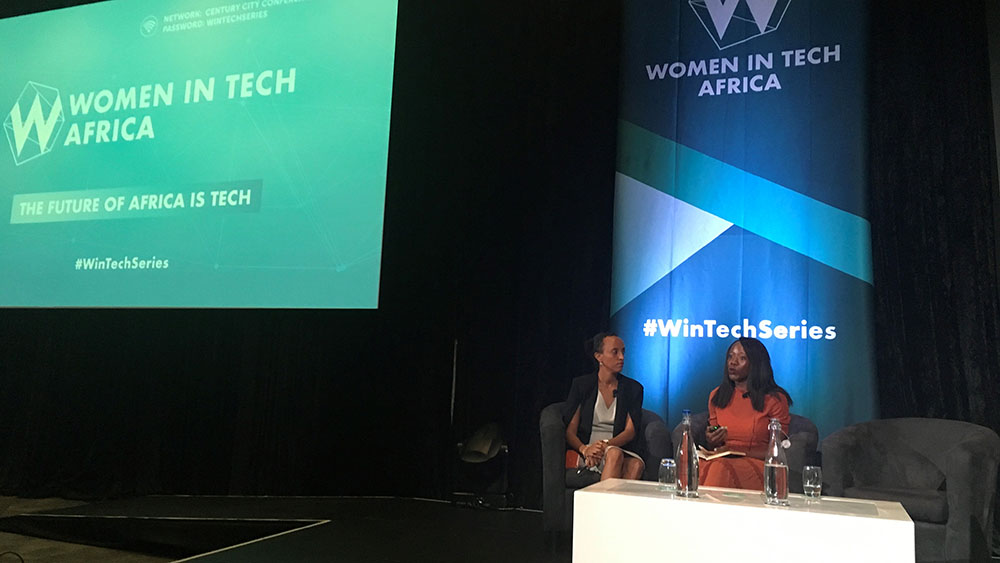
Microsoft launched its 4Afrika initiative in 2013, the same year Abdella came on board, with an ambitious agenda. The Fortune 500 company promised to expand affordable access to the internet; develop skilled workforces that could compete with engineers on a global level; and support African-led start-ups, businesses, and government organizations both through technical support and training and investments in digital infrastructure.
At the time, just 12 percent of sub-Saharan Africans were internet users, compared to 84 percent in the U.S. Without access to digital tools and networks, small businesses struggled to scale their operations beyond local markets, and although education among young people was trending upwards, unemployment remained as high as 51 percent in some countries due to a shortage of job opportunities.
In 4Afrika’s early stages, Abdella and her team doubled down on connectivity, bringing individuals and businesses online for the first time. Next, they focused on narrowing the skills gap, launching a network of training and career development programs where students and professionals could learn cutting-edge skills in programming, artificial intelligence (AI), and automation. By 2020, they were operating 25 “Skills Labs” in 15 countries, training young learners for careers in technology, and Interns 4Afrika had placed 1,019 interns with 282 partners.
In 2019, Abdella celebrated the launch of Microsoft’s African Development Centre: an engineering hub focused on AI, machine learning, and “mixed reality” innovation with locations in Kenya and Nigeria. The center hired 100 full-time engineers from across Africa that year, with a total of 500 expected to be employed by 2023.
“That was a moment of pride,” says Abdella. “It showed that in Africa we have developers who can work alongside software engineers in Redmond or Seattle and have direct reporting lines. And it allows us to make sure those who have been aspiring to go into the technology space don’t have to necessarily leave African soil to be able to pursue that dream.”
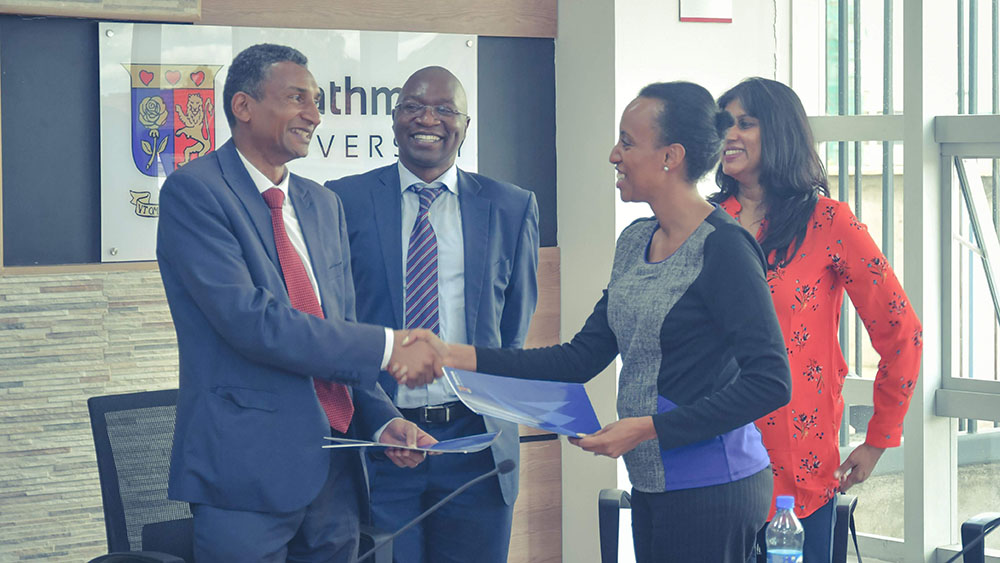
All about impact
The Ethiopian-born Abdella is particularly interested in how technology can be used to solve problems for her fellow citizens, whether by ensuring healthcare access for rural families or helping struggling farmers achieve financial independence.
“My decisions are based on where technology could be a primary driver for change,” Abdella explains. “Where are the areas that are growing and that can have a societal, but also economic, influence?”
With her team’s support, a company called BroadReach has utilized Microsoft cloud services to help connect an estimated 340,000 South Africans to HIV treatment, and to reduce the amount of time taken to analyze data from 1,000 sites across the country from eight months to less than one. In Kenya, 4Afrika has partnered with the Ministry of Agriculture, Livestock, Fisheries and Cooperatives to bring state-of-the-art technology like solar-powered irrigation systems to their farming communities.
Abdella credits Heller’s MA in Sustainable International Development program with giving her the framework through which to assess opportunities and drive outcomes. Effecting change on a scale as large as the African continent requires strategic thinking and a holistic view that spans industries, markets, and governments—skills she began honing in the company of her Heller classmates.
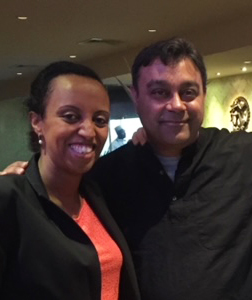
“Coming in was absolutely mind-boggling because I joined a year out of undergrad and I was in class with friends and students who had worked for so many years and had so much insight to share,” she recalls. “It wasn’t just theory discussion. They could tell you exactly what programs they had implemented, what worked, and what didn’t.”
“The community was just one of the best,” she adds. “It was just exceptionally smart, dedicated folks who magically came together.”
Before arriving at Microsoft, Abdella worked for several Africa-focused nonprofits and governmental organizations, including stints at the World Bank and the World Economic Forum, identifying emerging markets and investment opportunities across Africa with government and business leaders. When Microsoft announced its 4Afrika initiative, she didn’t hesitate to jump aboard, believing that the position would offer her the largest platform to drive change.
“For me it’s about what you set out to accomplish and not limiting yourself to the public or private sector,” she says. “It’s about being sector-agnostic in how you approach it.”
Innovation in the Cloud
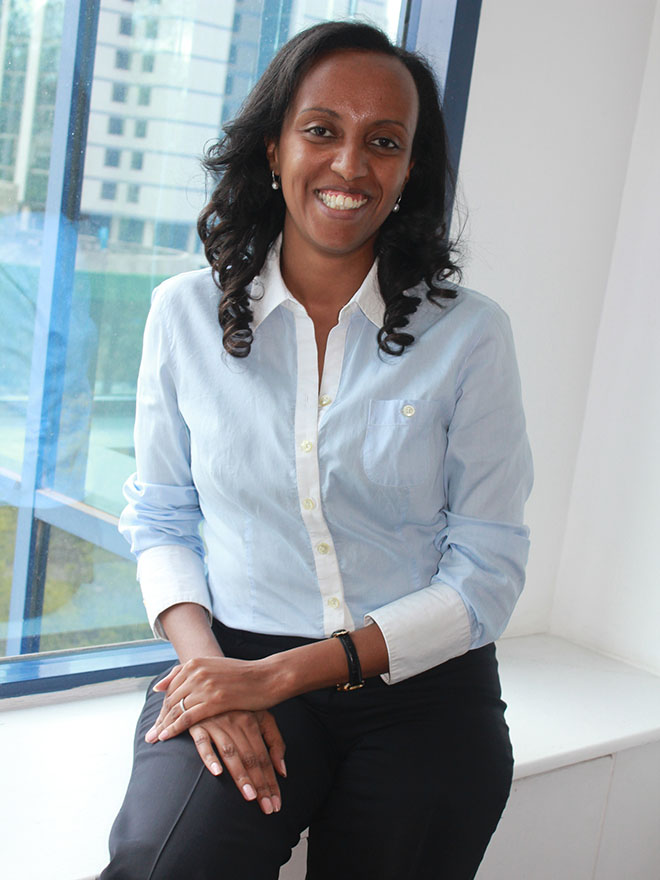
When Abdella first joined Microsoft, the company was still heavily invested in devices and services, but several years later, cloud computing emerged as its primary focus. In African countries, where some businesses are coming online for the first time, cloud computing allows them to skip costly infrastructure developments and quickly catch up to the rest of the tech world, Abdella explains. “The accessibility, the security, and the affordability really changes how any company can develop,” she says.
Cloud computing is at the core of many of 4Afrika’s partnerships and investments in African businesses and organizations, including more than 300 start-ups. In March 2020, The Awareness Company, a tech start-up that champions data-driven storytelling, used Microsoft technologies to develop a data visualization chart tracking COVID-19 cases in South Africa. With support from 4Afrika, the company went on to partner with the United Nations Economic Commission for Africa to develop an integrated COVID-19 dashboard for the entire continent, allowing public health officials to study infection rates and resource availability more effectively.
Partnerships like these involve more than simply handing over technology products, says Abdella. 4Afrika offers a combination of funding and tech support to most businesses and organizations it works with, as well as robust business development services to start-ups that need help putting their ideas into action. If a business has a specialized need that Abdella’s 23-person team can’t meet, she looks for outside partners to join the effort. “It’s about making sure they get everything they can from us,” she says.
Thinking big
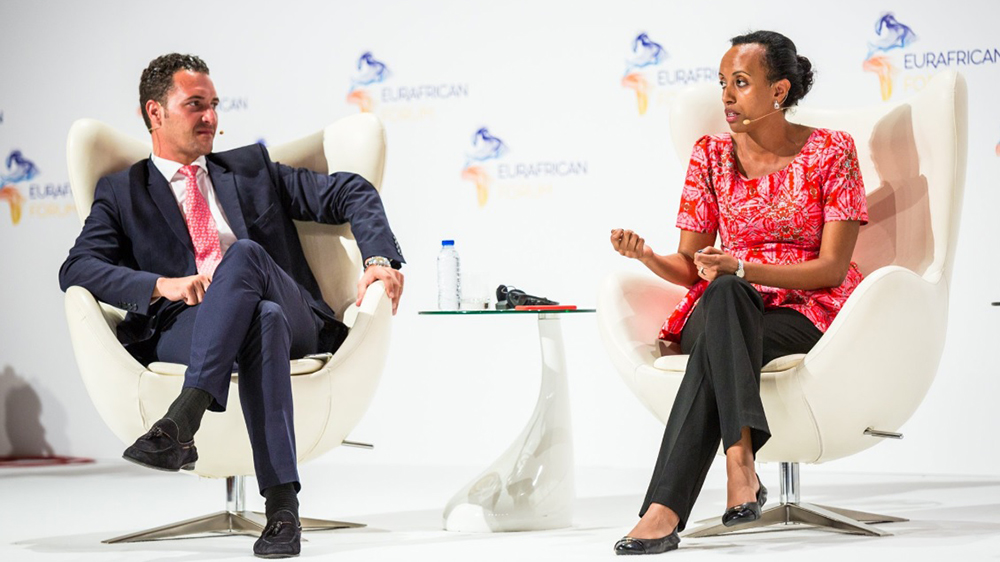
Since her arrival, Abdella’s contributions to Microsoft and Africa have garnered recognition from all corners.
Wanjira Kamwere, a business development manager at 4Afrika, says, “Amrote genuinely has a passion and love for advancing initiatives that increase the continent’s competitiveness and uplift the livelihoods of all Africans. She is a great advocate for the potential of the African people and continent.”
Last year, Abdella was listed tenth among Choiseul Africa’s “Top 100” Business Leaders, which recognizes Africans under 40 who are shaping the continent’s economic future. In 2019 and 2018, she was recognized by Jeune Afrique as one of the top 50 influential leaders shaping digital evolution and supporting start-ups across Africa.
Under her leadership, 2.5 million Africans now have access to high-speed internet, and 1.7 million small and medium enterprises have been touched through 4Afrika’s outreach. More than 180,000 students and professionals have acquired digital skills through its programs, and 3,000 interns have received placements.
Still, Abdella feels there is much to accomplish. In the next decade, she hopes to see stronger, more transparent governments in place throughout Africa, and for more globally competitive businesses to take hold.
At the same time, she’d like to see large numbers of young Africans taking up space in the country’s entrepreneurial and technology sectors—“skilled and knowledgeable young men and women who can really drive and make a difference.”
There is no existing model for how to make this version of Africa a reality, but at Microsoft, Abdella is free to think big and experiment, without quarterly earnings requirements or sales targets. Recently, her team began planning for post-COVID recovery in Africa, looking at how technology can be deployed to address the aftermath of a global pandemic. It’s an unprecedented challenge, which is where Abdella’s team thrives.
“We build this as we fly it, we make it up along the way,” she said. “If we fail, we fail fast, learn faster, and then move forward.”
